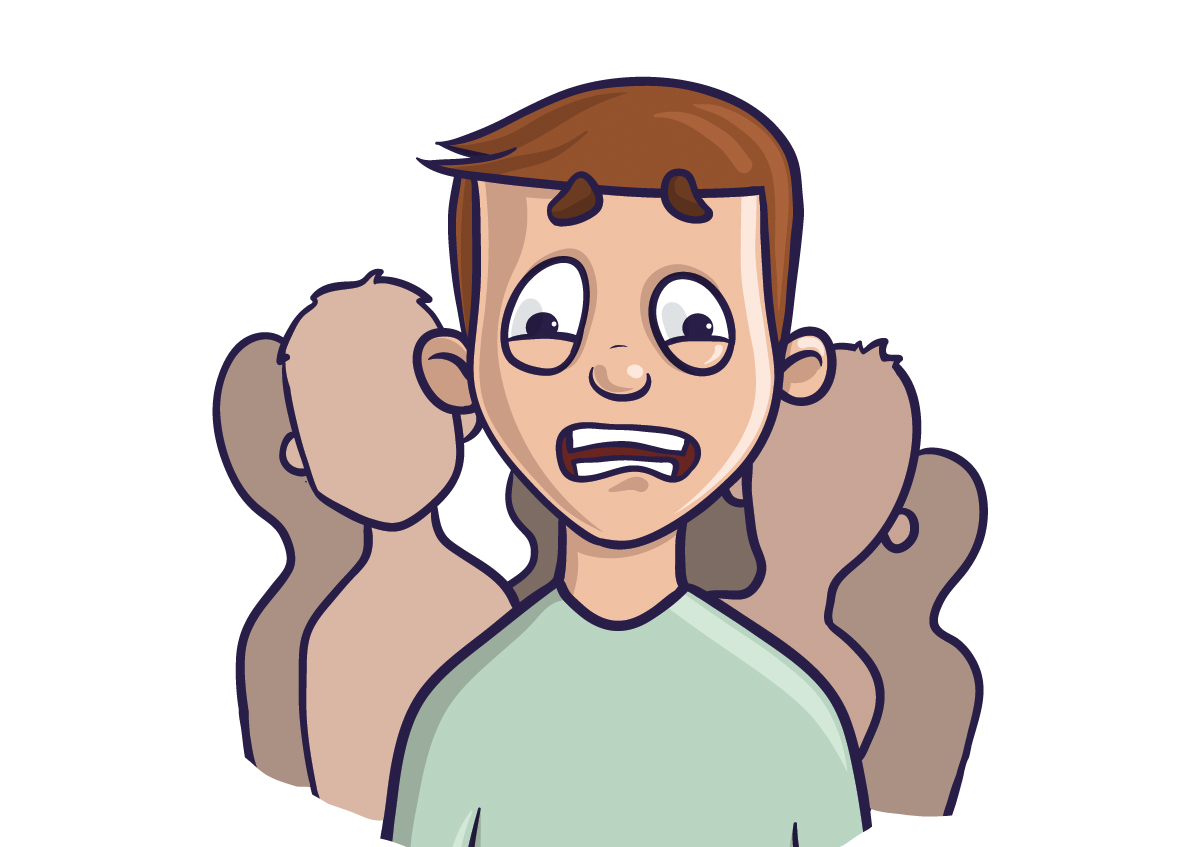Why Social Anxiety Exists

Social skills are coveted by many, but they are also the most difficult to practice. This is the problem that keeps many of us from actively improving our social skills. Most of us don’t improve our skills to begin with, since practicing is pretty boring. Many people would love to play an instrument, but it’s the many boring hours of practice required (when we could be doing something more enjoyable) that’s keeping us from learning.
But anything that involves other people make it that much worse. The main thing keeping us from practicing anything that involves other people is social anxiety. It’s one thing to sit at the piano and practice scales over and over. It’s something else completely to start a conversation with ten people a day just for practice.
In fact, this idea, of talking to people just for practice, causes anxiety just thinking about it. So we don’t even like the idea that practicing social skills is necessary. We think of social skills as something some people can do, and some people can’t. Or even if we admit that practice will increase our skills, we come up with a million and one reasons why we’re going to start….tomorrow.
Everything Is A Skill
But everything we humans can do is a skill. Every skill can be improved with practice. There are very few things you cannot improve with practice. There may be reasons we can’t practice (time, cost, etc.) but the idea is solid. If you want to do better at something, then you need to practice that something.
But What Do I Say?
The good thing about social skills, conversational skills, and general people skills is most people have it backwards. Most people have this idea that we have to present ourselves as some kind of entertainers, or performers, and then let them judge us.
But we’ll learn not only why that’s backwards, but a specific technique that doesn’t require you do any talking at all. But first, we’ve got to get over the reasons why everybody has a certain amount of social anxiety.
The Story Of You

Don’t worry, we won’t go too far down the emotional rabbit hole. Only a few sentences will be required to demonstrate why you and every other human has social anxiety. Some have only a little, that they can easily overcome, some have a lot.
Once Upon A Time
You were very young and didn’t know anything about anything. You only knew two things in a vague sense. Good things and bad things. You came preprogrammed with a very effective strategy to get rid of the bad stuff, and get the good stuff. When bad stuff showed up, you screamed your little head off. Until somebody came and fixed whatever it was.
When you felt good stuff, you made all kinds of cute faces and sounds. This is Mother Nature’s strategy to make sure baby humans are cared for. When we are happy, we make sounds and faces that make everybody else happy. When we aren’t happy, we scream like crazy until the grown ups fix it.
Learning To Walk And Talk
This all changes when you become mobile. When you could get up and walk around. And touch things you shouldn’t. So this created a few new cause-effect scenario in your brain that played over and over again. Because you never knew which was going to be which, the end result is anxiety.
Good Cause-Effect
You see something interesting. Something you want. You motor yourself over to get it, and everybody gives you massive applause. Good feelings. Happy days. The Universe is in proper working order.
Bad Cause-Effect
You see something interesting. Something you want. You motor yourself over to get it, but as you do, some grown up gets pissed. Angry. Mean faces. Unhappy words. What the fuck? The Universe is broken!
End Result

Since you never knew before hand what was OK and what was not OK, you ended up having anxiety associated with going after what you wanted. But on a deeper level, you associate other people with the anxiety, since even if you went after some object (like an electrical outlet) the anger came from people.
So today, when you think about strolling over to an interesting person (even if it’s just for practice) to start a conversation, you are subconsciously reminded of all those times you did just that and got yelled at. And unfortunately, many of those times that you are subconsciously remembering is when you sought attention from the same person who ended up yelling at you.
Will People Always Be Scary?
This is the paradox of being human. All people feel the same way about approaching strangers. All people wish interesting strangers will approach them and get the ball rolling. And all people that do the approaching report the same thing.
That we are terrified of walking over and expressing an interest in the other person. That they will reject us just for the thought. But the opposite will almost always happen. Few people will be upset or angry if an interesting person comes over to start a conversation.
Research This To Prove It Yourself
Find a place to people watch. A people where people go to meet people. Watch the people that are the most extroverted and outgoing. You’ll notice these very people who are doing what most of us are terrified of doing, for fear of rejection, are the least rejected people in the place.
Find the people that are the least outgoing and social. The people so terrified to even make eye contact with strangers for fear of rejection, or even just because they can’t handle the anxiety it causes. What is the result? They are ignored by everybody.
Find 100 Cases
Just to prove this, find 100 people who are not outgoing. Who don’t go up and talk to strangers. You’ll find in nearly every case (unless they are a gorgeous girl or a movie star guy) nobody will pay them any attention.
And you’ll find that the people who do express themselves, who do start conversations with strangers, they are the ones that are the most accepted by others.
Yeah, But I Still Have Anxiety!

Yes, of course you do. Logic and scientific research won’t cure squat. But before we get to the practice part, we need to make another important distinction.
You Can’t Get Rejected If You Have No Intention
If you started walking up to random strangers asking them for sex or money, you’d get rejected by most of them. (Most? Seriously?!) So in order to not get rejected, don’t ask for anything. Don’t have any ulterior motives.
This practice involves only talking to people to get practice talking to people. You’re not doing this to get dates, or numbers, or even names. You’re only doing this to practice your general conversational skills.
That. Is. All.
Of course, later on, once you find it easy and natural to start conversations, you’ll start to get a sixth sense of who enjoys talking to you and who doesn’t. When you get to that point, taking the conversation further is easy. If you like talking to them, and they seem to like talking to you (the more you practice the easier it will be to tell) you must close somehow. Or they’ll close you.
No Outcome
Being outcome independent is a common idea, but it usually comes with a paradox. A guy wants some kind of success with a woman, so he reads about being outcome independent. So he sees a girl he likes, and he wants to get to know her. At the very least, he would like her phone number. So the paradox is how can you be outcome independent when you have an outcome?
Play The Long Game

The idea is to actually not have any outcome. Not just pretend you don’t have an outcome so you can be outcome independent as a strategy to get an outcome. But to actually have zero outcome. The rest of this post will be a billion times easier if you have zero outcome other than experiencing human interaction. And since you will experience human interaction no matter what you do, you don’t need to have any outcome at all.
For the rest of this post, assume will never again ask for any contact information. You will never again ask for somebody else’s name. Seriously. Keep doing the following suggestions without closing until closing seems SO EASY that you do them without thinking. That means when in doubt, DO. NOT. CLOSE.
Why This Will Work
Since you are reading this, you likely have some social anxiety. Which means when you talk to people, you have less than attractive energy. The harsh truth of us humans is that being socially outgoing and fearless is more attractive than being reserved with social anxiety.
So what you will do is do the practice exercises without ever closing anybody ever. The best way to be outcome independent is to have zero outcome! So right now, make a promise to yourself. You will not ever close anybody ever again until you notice the words coming out of your own mouth without your consent. Unless it seems as normal as answering your own phone when it rings, let that moment come to you in its own sweet time.
Pacing Ice Breakers
The first step of any conversation is to say something that they will agree with. This means a lame comment about the environment. An X is Y statement, with an added tag question if you like. It sure is X in here, isn’t it! The X sure is Y, isn’t it! (it is hot, the band is loud, it is crowded). That’s it. If they respond, fine. If they don’t even notice you at all fine. The outcome doesn’t matter
See this as you practicing saying ice breaking pacing statements. How they respond isn’t your concern. If they smile and grab your crotch, that’s their business. If they look at you like they want to stab you in the eye with a ice pick, that’s their business. Other humans do what other humans do, and we have very little control over that. Keep saying ice breakers until it’s easy and anxiety free. Be sure to collect a wide variety of responses for your memory banks (except maybe getting stabbed in the eye).
Simple Questions

Once you get enough responses, you can ask simple questions. Only ask people who respond positively. Make a rule that if people say something back to agree with your lame pacing statement, then you ask them a simple and equally lame question. Make it a yes or no question. Yeah, I know all the communication books say don’t ask these, but at this point, you’re just getting your conversational feet wet.
No matter what you say as an ice breaker, and no matter what lame question you ask (make sure it is a yes or not so it is easy for them to answer) smile and nod. You’re done.
Do this until you can throw out a pacing ice breaker to anybody with a pulse, and can follow this up with a simple question to friendly people who deserve it without any rise in your pulse. Spend two years practicing this if you need to. Keep going until it’s easy and second nature.
Follow Up Questions
Once you ask a simple question and get a simple answer, you can ask a follow up question. Anything that gets slightly more information. To start warming up for these, keep a journal of questions you could have asked when you were on the above step.
This can be questions about their opinions on something, or anything that is slightly less lame. Do this until it’s easy and second nature. The further you get with these exercises, the easier it will get. Humans are social animals and humans talking to other humans is part of our standard operating procedure.
Follow Up On Their Interests
The next step is to start asking them things about what they are interested in. Right now, you might be absolutely clueless what this means. Don’t let this stop you from saying hey to people just for practice. Like before, once you are in the “ask follow up questions” phase, you can go home and think of some questions you could have asked.
Meta Model Their Future Interest

The meta model is a powerful tool. You use it to get more specific information when they say something vague. Since we humans are always saying vague things, you can always use the meta model. Only ask meta model questions about things they enjoy talking about. Only ask meta model questions with zero judgment. Only ask meta model questions if you are not winding them up for a lecture. here are some examples:
I’m thinking of going to college. (vague)
Yeah? What are you going to study specifically (meta model)
I’m thinking of studying art history. (vague)
Cool. I’m not much of an art guy. What kind of art, specifically, are you interested in? (meta model).
Early renaissance type stuff. (vague)
Wow, I know nothing about that. What are some specific pieces from that era? Can you show me? (meta model)
Always Journal
This will be a skill that is constantly evolving. Every time you have a conversation with somebody, always spend some time journaling of things you could have said, or things you said that didn’t work. Remember, conversation skills are skills. They take time and practice. There are no magic shortcuts.
Meta Model Magic

Once you get to the point where you are asking meta model questions about their interests, and their future interests in particular, you’ll be golden. People will naturally enjoy talking to you. And when they suspect the conversation is coming to a close, they will be very eager to get your contact number.
Being totally interested in somebody else is very rare. So rare that when we encounter these people who are not only relaxed but mostly interested in us instead of blathering on about themselves, we like them a lot. You will become this person. Give yourself plenty of time to get to the natural meta model level. When you get to this level, people will be clamoring for you and blowing up your phone.
Take your time to get there, because when you do, you will have an eager circle of friends to choose from, and you’ll always have a party to go to.
Learn More

Mind Persuasion has plenty of books and courses all desgined to teach you rock star social skills.
Mind Persuasion Books
Mind Persuasion Courses